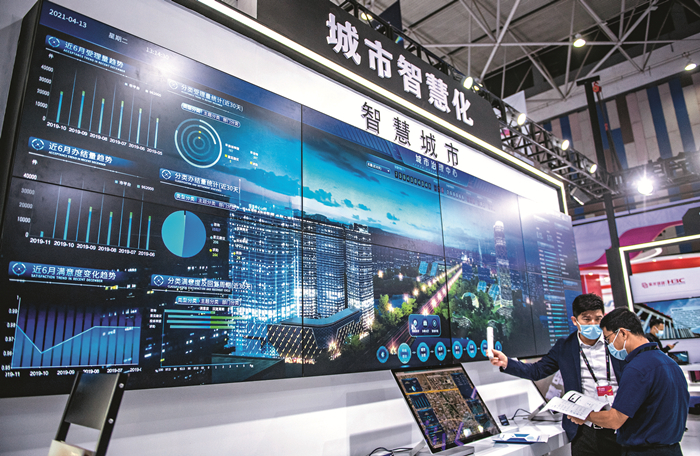|
||||||||||
| Home Nation World Business Opinion Lifestyle ChinAfrica Multimedia Columnists Documents Special Reports |
|
||||||||||
| Home Nation World Business Opinion Lifestyle ChinAfrica Multimedia Columnists Documents Special Reports |
| Current Cover Story |
| Expanding Space of Technology |
| The digital economy is making more contribution to growth and opening doors to a better life |
| By Li Kaizhi 丨VOL. 14 APRIL 2022 ·2022-03-24 |

Photo taken on March 1 shows the National (Zhongwei) New Internet Exchange Center in Zhongwei, Ningxia Hui Autonomous Region (XINHUA)
In his Report on the Work of the Government on March 5, Chinese Premier Li Keqiang called for boosting the digital economy. This is the fifth time since 2017 that the digital economy has been mentioned in the annual Report on the Work of the Government.
Digital economy refers to the direct or indirect use of data for the utilization of resources. At the technical level, it includes emerging technologies such as big data, cloud computing, Internet of Things, blockchain, artificial intelligence, 5G communication, etc., so as to guide and realize the optimal allocation and regeneration of resources, and achieve high-quality economic development.
Digital economy is becoming a key force in restructuring global factors of production, reshaping the global economic structure and changing the global competition pattern. Kang Yong, Chief Economist at KPMG China, said in an interview with Securities Daily that the development of digital economy is a strategic choice to grasp the new opportunities created by the new round of scientific and technological revolution and industrial transformation. The healthy development of digital economy will be conducive to promoting the construction of China’s modern economic system and enhancing new national competitive advantages.
Policy support
The construction of information infrastructure is the foundation for the development of the digital economy. In recent years, China’s information infrastructure construction has accelerated significantly: The world’s largest and technologically advanced information and communication network has been built; 5G network covers all prefecture-level cities; the overall layout of the national integrated big data center system has been completed; and all eight major computing power hubs and 10 clusters that can channel more computing resources from the eastern areas to the less developed western regions have been established, among others.
The policies introduced by the government have provided a solid guarantee for the use of information technology to promote the intelligent transformation of traditional infrastructure, drive economic transformation and upgrading, and greatly enhance the ability to guarantee and improve people’s livelihood.
According to a plan announced by the General Office of the State Council on January 12, China will further promote the development of the digital economy during the 14th Five-Year Plan period (2021-25).
By 2025, the digital economy should be in full expansion mode, with the added value of core industries in the digital economy accounting for 10 percent of GDP.
According to the plan, efforts will be made to accelerate the construction of the information network infrastructure and a national-level integrated big data center system, coordinating computing power, algorithms, data, and application resources.
“The plan makes it clear that digital economy is the main economic form after agricultural economy and industrial economy. This definition indicates that digital economy aims to promote the overall economic development from the perspective of total factor productivity, and pays more attention to ensuring fairness and efficiency in development,” said Pan Helin, Executive Dean of the Digital Economic Research Institute of Zhongnan University of Economics and Law, adding that led by indicators at the national level, the digital economy will usher in a new round of refined development at different levels.
According to Pan, in the fields of agriculture and industry, different provinces, cities, and counties can find their own competitive advantages, and the same is true for the field of digital economy.
For instance, Shandong Province will cultivate more than 30 big data innovation and development laboratories, and the added value of the core digital economy will reach about 7 percent of GDP; Sichuan Province will have a digital economy worth more than 3 trillion yuan ($472.8 billion) by 2025; and Henan Province is striving for more than 15 percent growth in digital economy in 2022.
“Driven by the national plan, local governments will gradually introduce differentiated digital economy development plans in line with their own resource endowment and comparative advantages, so as to promote the formation of a national digital economy development pattern with diverse characteristics,” Pan noted.
At the same time, in order to improve the legal mechanism and ensure healthy development of digital economy, the formulation of local laws and regulations has laid an important foundation for national legislation. In December 2020, Zhejiang Province issued the first local regulation on promoting the development of digital economy. Since then, Shanghai, Guangdong Province and other places have also issued their own laws and regulations.

People learn about the Smart City Governance Center at the China International Big Data Industry Expo 2021 held in Guiyang, southwest China’s Guizhou Province, on May 26, 2021 (XINHUA)
Technology-led transformation
Statistics show that as of November 1, 2021, the total number of market entities in China exceeded 150 million, a net increase of 100 million in the past decade. These entities have contributed to the steady growth of China’s economic development, and created more than 700 million jobs.
Among them, the small and medium-sized enterprises (SMEs) account for a huge proportion. From this perspective, the key to promoting the development of digital industry is to focus on the digital transformation of SMEs, which can help them cut costs, improve efficiency, enhance the anti-risk capability and improve core competitiveness. However, most of them are still at the initial stage of digital transformation due to lack of capability and resources.
Taking the industrial digital development of the pharmaceutical industry as an example, in recent years, China’s traditional large pharmaceutical companies have accelerated the process of digitalization.
Chen Baohua, General Manager of Zhejiang Huahai Pharmaceutical Co. Ltd., said it is time to improve the digital transformation ecosystem of SMEs and speed up their digital transformation process.
“In the process of digitization, it is necessary to comprehensively analyze the changing trends of the internal and external environment and policies of the enterprise,” Chen said, adding that enterprises should take advantage of digitalization and build digital systems that are suitable for their operations and conform to the trend of ecological development of the whole industry.
In fact, digital transformation permeates all aspects of life, especially the booming development of digital currency as payment infrastructure in the digital economy era.
China rolled out a broad range of payment products to help both Chinese citizens and foreigners experience the convenience of mobile payment with China’s digital fiat currency, or the e-CNY, for small-value payments during the Beijing 2022 Olympic and Paralympic Winter Games.
It is an epitome of the pilot programs of the digital yuan. Over the past few years, China has launched the trial run of its digital currency in different areas. Data show that as of the end of 2021, the cumulative digital yuan transactions hit 87.57 billion yuan ($13.16 billion).
The research, development, and application of digital yuan can help better fulfill people’s demands for fiat currency in digital economy and improve the convenience and security of retail payments, propelling the development of China’s digital economy, Pan explained.
Digital security
At present, developing the digital economy has become a national strategy. However, the higher the level of digitization is, the greater the security challenges will be.
In recent years, cyber attacks have become a problem for the real world. Critical infrastructure, cities, and large enterprises have become the preferred targets of cyber attacks, and data theft has become a new menace.
In this context, Zhou Hongyi, Founder and Chairman of the Internet security company Qihoo 360, who is also a member of the National Committee of the Chinese People’s Political Consultative Conference (CPPCC), China’s top political advisory body, proposed to build a digital security emergency response system to address challenges in all digital fields such as industrial Internet, connected vehicles, smart cities, cloud security, data security and supply chain at this year’s CPPCC National Committee session in early March.
Digital security should be incorporated into new infrastructure to mobilize all social forces to participate in the construction of a digital security system, thus improving the country’s digital security, Zhou said.
In the smart vehicle industry, Zhou proposed the establishment of a long-term mechanism for intelligent connected vehicle collision test in digital space, requiring all smart vehicles sold in China to undergo this compulsory test before entering the market. In this way, “our customers will have a basic understanding of the capacity of cars to resist digital attacks,” said Zhou.
When talking about the security of SMEs, Zhou said that as the “capillaries” of China’s economy, SMEs contribute more than 50 percent of the tax revenue. With the advent of the era of the Internet of everything, the security gaps at SMEs not only endanger themselves, but also may become a springboard for attacks, causing harm to large enterprises, units, and even national security.
Therefore, Zhou proposed to encourage and support large enterprises with innovative lightweight products and software to bolster SMEs in such aspects as know-how, capital, technology and talent, promote the digital transformation of SMEs, contribute to China’s digital security, and lead the era of digital civilization.
Sharing the fruit
In recent years, China has gained the attention of the international community as a country that is focusing on the goal of global connectivity under the Belt and Road Initiative (BRI).
The BRI has opened wider the doors of bilateral and multilateral cooperation on regional and international levels, bringing opportunities for working jointly on digitalization of the global society.
Especially, the current pandemic has highlighted the significance of the BRI in global health and information and communication technology, which is advanced by the Digital Silk Road.
According to Ehizuelen Michael Mitchell Omoruyi, Executive Director of the Center for Nigerian Studies, Institute of African Studies, Zhejiang Normal University, China has been taking measures to deepen Silk Road e-commerce cooperation with 22 partner nations. Chinese e-commerce enterprises are expanding to BRI-participating nations and using e-commerce to bolster trade of each other’s quality and specialty products, which in turn could also solve the trade imbalance issue in China-Africa cooperation.
“The launch ceremony of the Forum on China-Africa Cooperation African Products Online Promoting Season and the ‘World’s Specialty’ African Special Event, was held both online and offline, on September 6, 2021. The event is important for promoting the China-Africa Partnership Plan on Digital Innovation, with the aim of deepening Sino-African e-commerce and trade cooperation in the wake of the pandemic,” Omoruyi said.
The Digital Silk Road framework is not only helping the Chinese and African economies move toward digitalization, but also increasing consumption in Africa and China, Omoruyi added.
|
||||||||||||
| About Us | Contact Us | Advertise with Us | Subscribe |
| Copyright Beijing Review All rights reserved 京ICP备08005356号-5 京公网安备110102005860号 |